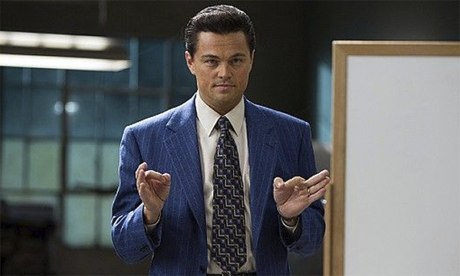
If you can imagine the honey-gravel of Ray Liotta's voice in Goodfellas saying: "As far back as I can remember, I always wanted to be a stockbroker" you'll get some idea of Martin Scorsese's new movie The Wolf of Wall Street. It's a raucous, crazily energised, if occasionally slightly shallow epic on a familiar subject, conducted in the classic voiceover-nostalgia style with sugar-rush jukebox slams on the soundtrack. I've watched it twice in quick succession now, and though it skirts the edge of cliche, the sheer sustained blitz of bad taste is spectacular. This movie sprints frantically, in the direction of nowhere in particular, like our appalling hero after his first ecstatic toke of crack cocaine. It is based on the memoirs of crooked broker Jordan Belfort who during the 1980s and 90s enjoyed unlimited amounts of sports cars, drugs and prostitutes, paid for by millions of dupes and dopes buying his fraudulently inflated stocks. Finally, like Henry Hill before him, Belfort has to swallow hard and confront the possibility of betraying his partners to minimise the inevitable jail term.
Leonardo DiCaprio – credited as producer, alongside Scorsese – plays Belfort and his character gets to the end of this long movie having learned nothing, conceded nothing and even physically changed in no obvious way. The vulpine salesman's broad smile is still more or less in place. The comparison with Hill is actually inexact: what Jordan wants to be specifically is rich, and shifting stocks on Wall Street is the way to do it. While Hill luxuriated in the minutiae and details of gangsterdom, and Sam Rothstein gave some feel for what the gambling world was about in Scorsese's Casino (1995), Belfort will often stop in the middle of explaining a financial scam, and say that we don't want to hear about anything as boringly technical as this – surely what we want is the naked girls and the wild times, and that's what we get.
It's entertainingly outrageous, and there's a shaggy-dog comic effect in seeing the same nightmare debauch over and over, although I don't think the coke'n'strippers war stories exactly constitute that critique of capitalism that some pundits have claimed for this film. Perhaps it's not obvious what Belfort has to tell us about Wall Street's decadence that hasn't already been said by Oliver Stone's Gordon Gekko or indeed Tom Wolfe's Sherman McCoy. But what gives the film its unwholesome black-comic fizz, and a measure of originality, is that Belfort never displays any remorse; there is no narrative comeuppance, no rebuke from anyone whose moral authority he recognises. The sulphurous whiff is conjured by his very impenitence. And if we suspect that in 2014 the financial world agrees with former Barclays CEO Bob Diamond that its "period of remorse needs to be over"– well, maybe Belfort is the broker for our times. And he never saw any need for any period of remorse in the first place.
It zooms along, and DiCaprio always looks the part – there's even a touch of Cagney sometimes. Belfort starts getting rich through selling unregulated penny stocks over the phone in a "chop shop": a bunch of guys cold-calling the public from landlines installed in a converted garage, as in Ben Younger's 2000 film Boiler Room.
Belfort impulsively hires his neighbour Donnie Azoff, played by Jonah Hill, a nerdy overweight guy with a weird cosmetic dental plate and Donnie becomes his beta-male wingman in the unending conquest of money and prostitutes. Belfort turns his operation into a glitzy firm and holds colossal trading-floor parties with dancing girls like a low-rent Charles Foster Kane. But when the Securities and Exchange Commission and the FBI start taking an interest, he needs to hide the cash through Swiss and British contacts, enabling a cameo from Jean Dujardin as the corrupt banker Jean Jacques Saurel and a glorious appearance from Joanna Lumley as Belfort's "Aunt Emma" with whom he has a wonderfully surreal romantic clinch. Although not a natural comedy player, DiCaprio has a great comic moment when a cheesy infomercial he's shooting is horribly interrupted by the forces of the law.
The best scene comes when the Bureau's dogged, straight-arrow agent Patrick Denham, played by Kyle Chandler, requests a meeting with Belfort aboard his yacht. They have some fascinating exploratory banter with much coded joshing about what a shame it is that Agent Denham makes so little money. What is going on here? It's a great moment: DiCaprio raises his game and the whole film achieves a new level of tension and complexity.
The Wolf of Wall Street does not quite have the subtlety and richness of Scorsese's very best work, but what an incredibly exhilarating film: a deafening and sustained howl of depravity.

